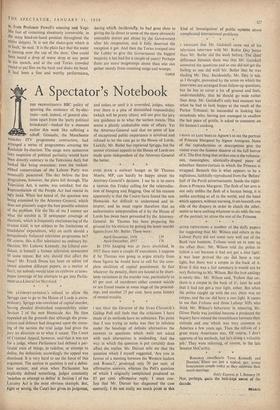THE ATTORNEY-GENERAL'S refusal to allow the Spriggs case to go
to the House of Lords is extra- ordinary. Spriggs was convicted of capital murder, having pleaded diminished responsibility under Section 2 of the new Homicide Act. He then appealed on the grounds that although the proSe- cution and defence had disagreed upon the mean- ing of the section the trial judge had given the Jury no direction as to what it meant. The Court of Criminal Appeal, however, said that it was not for a judge, where Parliament had defined a par- ticular state of things, to redefine, or attempt to define, the definition; accordingly the appeal was dismissed. It is very hard to see the force of this argument. The section in question is not a defini- tion section; and even when Parliament has explicitly defined something, judges constantly `redefine or attempt to define' it. Section 1 of the Larceny Act is the most obvious example. But, right or wrong, the Court has given its judgment, and unless, or until it is overruled, judges, when- ever there is a plea of diminished responsibility (which will be pretty often), will not give the jury any guidance as to what the section means. -This seems a plainly undesirable state of affairs. Yet the Attorney-General said that no• point of law of exceptional public importance is involved and refused to let the case go to the House of Lords. Luckily, Mr. Butler has reprieved Spriggs, but the sooner criminal appeals to'the House of Lords are made 'quite independent of the Attorney-General the better.






































 Previous page
Previous page